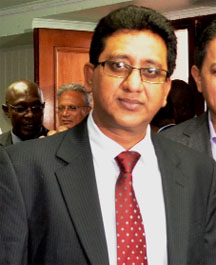Attorney-General Anil Nandlall says that the Sexual Offences (Amendment) Bill, passed unanimously in the National Assembly more than a month ago, will be assented to shortly.
Asked yesterday about the current status of the bill, which the government tabled after a major oversight in the landmark principal legislation was exposed by the courts, Nandlall said that it, among other bills, will be assented to shortly by President Donald Ramotar.

In a letter published in yesterday’s Stabroek News, a group of women representing the non-governmental organisation Help and Shelter called for the speedy signing of the amendment into law. “In view of its vital importance to the effective prosecution of sex crimes, we sincerely hope that this uncontroversial piece of legislation will be given presidential assent and so brought into effect as a matter of urgency,” the women wrote, while noting that the amendment had been passed unanimously by the National Assembly on January 3, 2013.
The amendment, which had been tabled in August last year just before the parliamentary recess, is to give the accused the right to lead evidence or submit written statements in the paper committal process. Its tabling came after a ruling by acting Chief Justice Ian Chang, who found that paper committals under the Sexual Offences Act were unconstitutional as the accused had no opportunity to give a defence in the Magistrate’s Court, breaching a constitutional right.
Meanwhile, Nandlall also said that the two opposition bills recently passed by the National Assembly are still to reach him. “My last inquiry revealed that the (opposition bills) were still with the Chief parliamentary Counsel for his examination,” he told Stabroek News when contacted on Friday.
The bills are the Fiscal Management and Accounta-bility (Amendment) Bill and the Former Presidents (Bene-fits and Other Facilities) Bill 2012.
Article 170 (2) of the Constitution requires that the president, who is part of Parliament, assent to bills presented to him following passage in the National Assembly. This article also states that where the president withholds his assent, he must return the bill to the Speaker within 21 days with a message stating the reasons for withholding his assent.
Nandlall’s recent description of the Attorney General’s role in the process leading to the president giving assent has prompted criticism by attorney Christopher Ram, who noted that it was not catered for in any law.
Nandlall said it was convention for the Attorney General’s Chambers to issue an assent certificate to bills passed by the National Assembly before they are forwarded to the president. All bills passed by the House are to be sent to the Chambers of the Attorney General by the Clerk of the National Assembly, firstly to be examined by the Chief Parliamentary Counsel and then by the Attorney General, who issues an assent certificate advising the President, that he may properly assent to the bill, “provided, of course, that in the opinion of the Attorney General, the bill is in order,” Nandlall had explained.
Clerk of the National Assembly Sherlock Isaacs had substantiated this position by indicating that during his tenure he has never submitted any bill for presidential assent without an assent certificate from the Attorney General.
In addition, Former Clerk of the National Assembly Frank Narain told Stabroek News last week that in his time during pre-independence, bills passed went to the Attorney General before they went to the governor for assent. “That was the practice… the Attorney General would vet the bill, not to make any changes, just to see that it was [in order]. Then he would issue an assent certificate. But we have had several changes over the years and the Attorney General has become a politician,” Narain explained.








